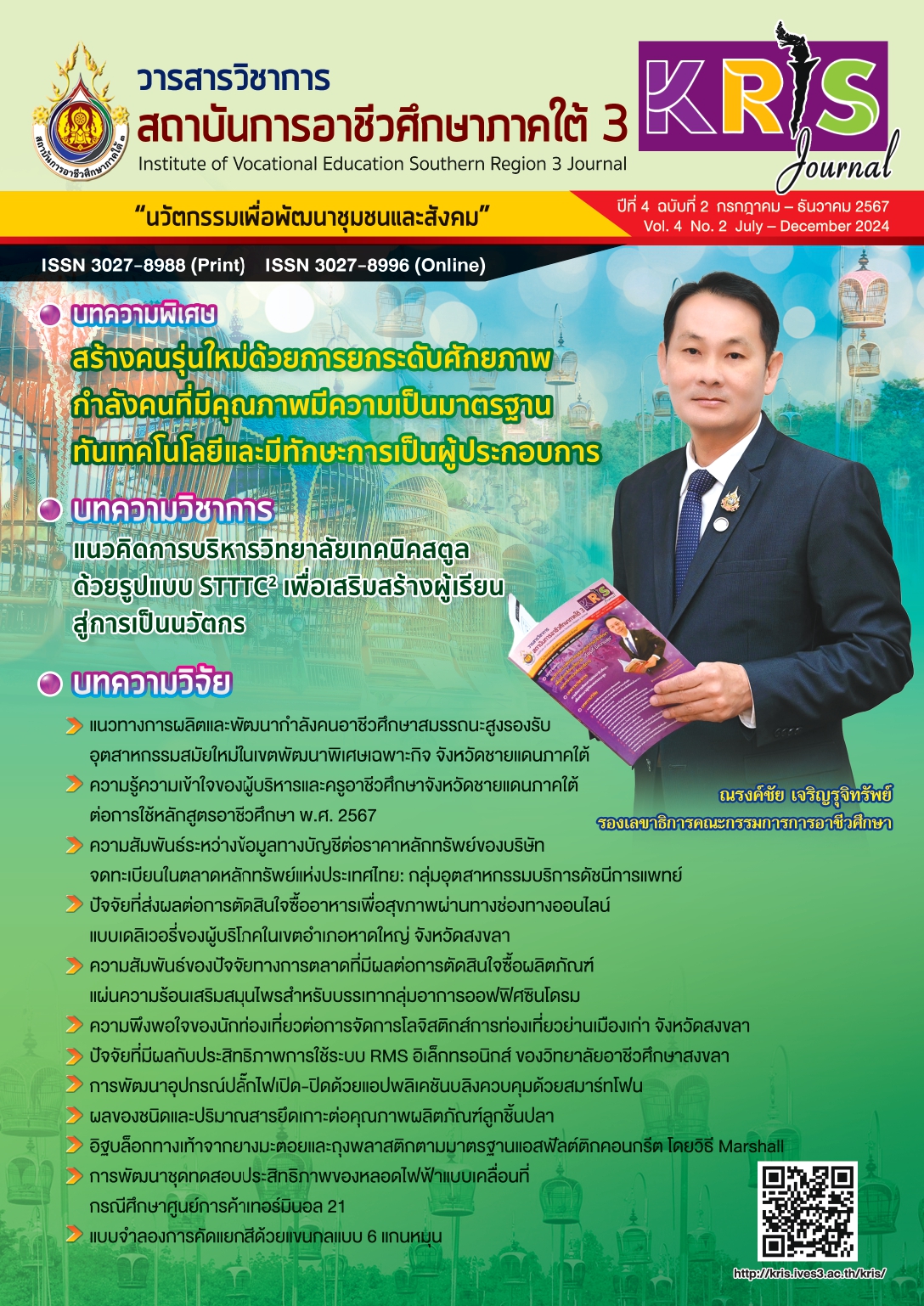Types and Quantity of Binders that Affect the Quality of Fish Ball
Keywords:
fish ball, binder, soy protein, xanthan gumAbstract
The objective of this research was to study the effects of types and quantity of binders on the quality of fish balls. The experiments were divided into 5 sets,. i.e., basic formula (control set), 0.1 percent soy protein, 0.2 percent soy protein, 0.1 percent xanthan gum, and 0.2 percent xanthan gum, respectively. The physical quality, color value, gel strength, water holding capacity, and water loss were analyzed. The sensory qualities were also tested, including color, odor, taste, elasticity, and overall liking, which reported by 10 trained panelists. The results showed that the fish ball products with soy protein added as a binder had better quality than the ones with xanthan gum. The addition of 0.2 percent soy protein had the best effect on the quality of the fish balls, with a slight effect on the color value, gel strength value of 903.83, water holding capacity of 30.95, and water loss of 5.71, when compared to the experimental sets with xanthan gum and the control set. The results of the sensory study showed that the experimental set with 0.2 percent soy protein added received sensory acceptance scores in all characteristics, namely color, odor, taste, elasticity, and overall liking with the average scores of 7.10, 7.20, 8.40, 8.20, and 8.60, respectively.
References
สุทธวัฒน์ เบญจกุล. (2549). ซูริมิ : วิทยาศาสตร์และเทคโนโลยีเนื้อปลาบด. โอเดียนสโตร์.
กันต์วิรุฬห์ พลูปราชญ และณัฐนรี สมิตร. (2563). พฤติกรรม และความต้องการทางด้านผลิตภัณฑ์อาหารเพื่อสุขภาพของผู้บริโภค ในเขตกรุงเทพมหานคร. วารสารวิทยาลัยดุสิตธานี, 14(2), 308-322.
สำนักงานมาตรฐานสินค้าเกษตรและอาหารแห่งชาติ. (2549). ข้อมูลการบริโภคอาหารของประเทศไทย. โรงพิมพ์ชุมนุมสหกรณ์การเกษตรแห่งประเทศไทย.
จักรี ทองเรือง. (2544). ซูริมิ (Surimi). จุฬาลงกรณ์มหาวิทยาลัย.
จันทร์เพ็ญ ขำมิน, วันวิสาข์ ยวงใย และวัชรี คงรัตน์. (2563). การพัฒนาคุณภาพเนื้อสัมผัสลูกชิ้นปลาแช่เยือกแข็งจากซูริมิปลาซ่ง: รายงานวิจัย. กองวิจัยและพัฒนาเทคโนโลยีอุตสาหกรรมสัตว์น้ำ กรมประมง กระทรวงเกษตรศาสตร์และสหกรณ์.
วรางคณา สมพงษ์ และสิริการ หนูสิงห์. (2561). การปรับปรุงเนื้อสัมผัสของเจลลูกชิ้นปลาโดยการใช้กัมเมล็ดมะขาม. วารสารวิทยาศาสตร์และเทคโนโลยี, 27(2), 288-301.
Tee, E. T. and Siow, L.F. (2017). Effect of Tapioca and Potato Starch on the Physical Properties of Frozen Spanish Mackerel (Scomberomorus guttatus) Fish Balls. International Food Research Journal. 24(1). 182-190.
นิสานารถ กระแสร์ชล, นฤมล บำรุงศาสตร์ และวัชราภรณ์ เทศศิริ. (2560). ผลของแคลเซียมคลอไรด์และไข่ขาวผงต่อคณภาพของผลิตภัณฑ์ปลาทรงเครื่องจากเนื้อปลาลัง (Rastrelliger kanagurta). วารสารวิทยาศาสตรบูรพา, 22(3). 569-580.
สุนันทา ทรงกัลยาณวัตร. (2550). สมบัติของเจลโปรตีนถั่วเหลืองสกัดที่เตรียมโดยแทรนส์กลูตามิเนสและการประยุกต์ใช้ในผลิตภัณฑ์ลูกชิ้นปลา [วิทยานิพนธ์วิทยาศาสตรมหาบัณฑิต]. จุฬาลงกรณ์มหาวิทยาลัย. https://cuir.car.chula.ac.th/handle/123456789/31353
Downloads
Published
How to Cite
Issue
Section
License
Copyright (c) 2024 Institute of Vocational Education Southern Region 3 Journal (KRIS Journal)

This work is licensed under a Creative Commons Attribution-NonCommercial-NoDerivatives 4.0 International License.






